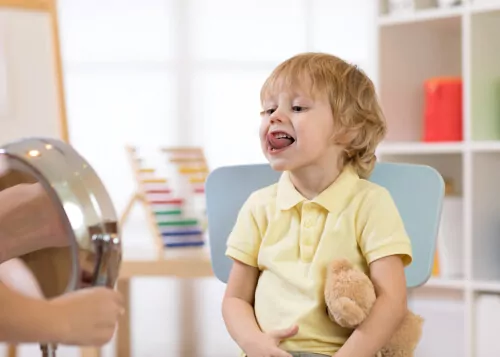4 Kids’ Oral Motor Exercises for Muscle Weakness
May 8, 2024 Parents asked: "My son started to babble like he wants to have a conversation with me. I noticed he doesn't use his tongue. What kind of kids' oral motor exercises should I do?"
Are you starting to think that your child has trouble speaking? Ok, stay calm. If you see your child not using a part of their mouth that they need to use, especially at around 2–3 years old, you need to get them evaluated by a speech pathologist to rule out any type of oral-motor disorder. Articulation issues are just one sign that help may be necessary.
The good news here is that a child who is babbling is attempting to communicate. Babbling is a precursor for language, so if your child is doing that, they are on the track to communicating more through words.
What is an Oral-Motor Disorder?
Oral motor disorders can fall into three main categories:
- Oral or verbal apraxia: the inability for the mouth to do what the brain tells it to do due to motor planning difficulties;
- Dysarthria: the inability to eat safely or speak clearly due to muscle weakness or sluggishness;
- Delay in the development of musculature for eating.
Causes of Oral-Motor Disorders
Oral motor disorders can be caused by incorrect motor programming of the muscles of the mouth – the brain sends a message to the mouth muscles, but the muscles either don’t receive or misinterpret the message.
Then the muscles don’t move or move in the wrong way, making it difficult to manage food in the mouth and to produce intelligible speech.
Some children may have difficulty remembering the movements, which then makes it difficult to make the sounds automatic.
Do you feel like your child is struggling with his speech?
Take this free cutting-edge 3-minute quiz. You will find out if your child is on track with his milestones and receive a free personalized report.

Low muscle tone of the lips, tongue, or jaw can be another cause. I don’t know the details about the child in question, but if your child is showing issues with movement of certain parts of their mouth, watch them eating, as well.
If it’s a true issue, they will have difficulty moving food around in their mouths. They may also have issues drinking from straws if they have lip or tongue weaknesses.
Get Evaluated for Speech Therapy
If you suspect an oral motor disorder, your pediatrician can refer you to a speech-language pathologist (SLP) who can properly diagnose your child.
The therapist will interview you to see what you are noticing at home, but will also perform an assessment on your child.
This assessment may include the following:
- Checking for signs of weakness or low muscle tone in the lips, jaw, and tongue.
- Seeing how well the child can coordinate mouth movements by having her imitate non-speech actions such as moving the tongue from side to side, smiling, frowning, and puckering the lips.
- Evaluating the coordination and sequencing of muscle movements for speech while the child performs tasks such as the diadochokinetic rate, in which the child repeats strings of sounds such as puh-tuh-kuh as fast as possible.
- Testing the child’s skills in “real-life” situations, such as licking a lollipop, and comparing this to skills in “pretend” situations, such as pretending to lick a lollipop.
If therapy is recommended, the therapist will instruct you on what movements and exercises you can do based on your child’s weakness.
4 oral-motor exercises for speech clarity to try at home
Here are four toddler activities that include articulation and other speech exercises:
- Blowing bubbles. This is for lip and cheek weakness, but it’s fun and kids will play with bubbles without even knowing it’s therapy.
- Using straws to drink. This works on every aspect of a child’s mouth. Children should be using straw cups by 1 year of age.
- Making funny faces. Have your child look in a mirror and imitate funny faces. Again, these faces will depend on what weakness your child is displaying. Also practicing chewing exercises for toddlers will help!
- Lollipops. Yes, they can be used in therapy. Your therapist will have your child lick the lollipop or different candies using their tongues in different positions so that the tongue gains strength. Doing tongue exercises for speech therapy is very important.
